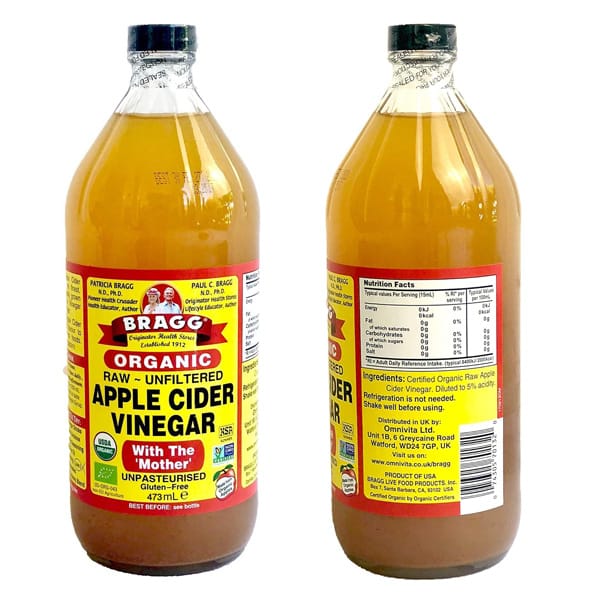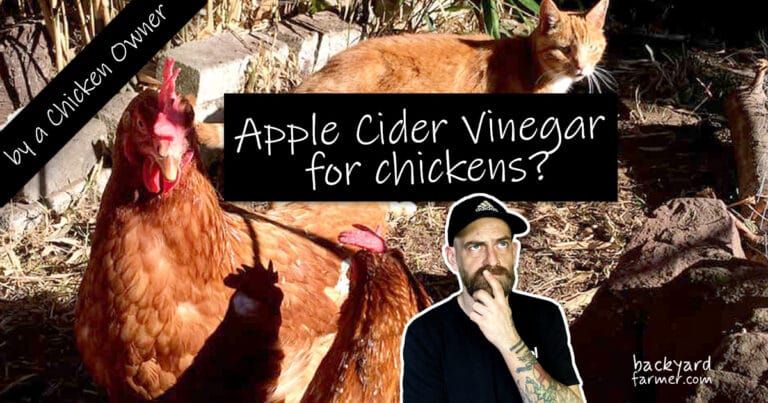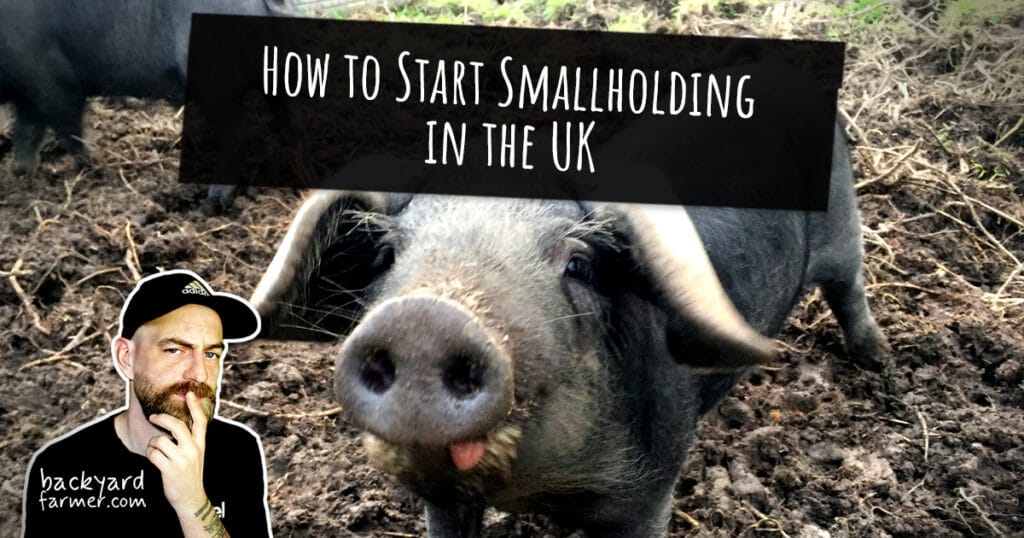Introduction
Looking for a natural way to support your chickens’ health? Apple cider vinegar for chickens has become a popular natural supplement among backyard poultry keepers—and with good reason.
This simple, affordable supplement is commonly used to:
- Improve digestion
- Encourage hydration
- Help deter worms and mites
In short, it’s an easy way to support a happy, healthy flock naturally. What’s more, the benefits of apple cider vinegar for chickens often go beyond physical health—it may also help promote calmer behaviour and reduce stress across the flock.
That said, it’s important to use it correctly. Too much, or using the wrong type of vinegar, can do more harm than good.
What You’ll Learn in This Guide
In this article, you’ll discover:
- The main benefits of apple cider vinegar for chickens
- How much apple cider vinegar to give chickens (and how often)
- Which type of apple cider vinegar is best for chickens
- Common mistakes to avoid
So, whether you’re brand new to keeping chickens or you’ve been caring for a flock for years, learning how to use apple cider vinegar properly can make a noticeable difference to their overall health.
Let’s take a closer look at why this natural remedy deserves a permanent place in your coop care routine.
🐔 Bonus tip: Want to explore more natural flock care? Check out our guides on garlic for chickens and herbal mite deterrents.
Continue your natural chicken care journey
If you’re exploring the benefits and use of apple cider vinegar for your flock, these guides will help you with related chicken health topics, nutrition, and poultry management.
- How to keep chickens in the suburbs – Tips for managing backyard chickens in garden and urban environments — helpful context for overall flock care.
- What can I feed my backyard chickens? – A comprehensive guide to safe, healthy feeding options that complement ACV use in your chickens’ water and diet.
- Guide: how to feed my chickens egg shells – Practical tips on recycling eggshells for calcium and integrating them into your chicken feeding routine.
Is Apple Cider Vinegar Good for Chickens?
Absolutely. When used correctly, apple cider vinegar for chickens can be a valuable natural supplement that supports overall flock health.
It contains trace minerals, acetic acid, and beneficial bacteria—especially when it includes “the mother.” Together, these help support digestion, strengthen immunity, and contribute to better overall flock health.
Key Benefits of Apple Cider Vinegar for Chickens
Used in moderation, ACV may help to:
- Deter internal parasites by creating a slightly more acidic gut environment
- Discourage mites when used as part of a regular coop-cleaning routine
- Support the immune system thanks to its natural antibacterial properties
- Reduce stress by improving nutrient absorption and gut balance
- Aid digestion by helping maintain a healthy digestive pH
- Support calcium absorption, which can improve eggshell strength in laying hens
- Encourage hydration, particularly during hot weather
While apple cider vinegar isn’t a miracle cure, it’s a reliable addition to your routine—especially when combined with clean water, good feed, and sensible coop management.
Tip: For the best results, always choose raw, unfiltered apple cider vinegar that contains “the mother.”
How Much Apple Cider Vinegar to Give Chickens
If you’re wondering how much apple cider vinegar to give chickens, the key is consistency and restraint. Using the right amount helps you see the benefits without upsetting digestion or interfering with calcium uptake.
Recommended Dosage
- 20 ml of ACV per 1 litre of water
- Offer this mixture up to four times per month
This schedule supports gut health without over-acidifying your chickens’ system.
Important Tips
- Avoid metal drinkers. ACV is acidic and can react with metal, causing corrosion and water contamination. Plastic or ceramic drinkers are best.
- Always choose raw, unfiltered ACV with “the mother” for maximum benefit.
- Keep an eye on water intake. If your chickens start drinking less, reduce the frequency or alternate with plain water.
- Used properly, ACV is a simple, budget-friendly way to support your flock’s long-term health.
Pro tip: Always mix ACV into fresh water just before serving to keep it effective and reduce the risk of bacteria building up in the drinker.
Does Apple Cider Vinegar Deworm Chickens?
This is one of the most common questions around ACV—and the answer needs a little nuance.
The Short Answer
Apple cider vinegar may help deter worms, but it is not a reliable dewormer. By making the gut environment slightly more acidic, ACV can make conditions less favourable for internal parasites.
Because of this, many keepers include ACV as part of a preventative routine. However, if your chickens already have worms, ACV alone will not clear an infestation.
Use ACV for Prevention, Not Treatment
- Add ACV to drinking water occasionally to support gut health
- Keep the coop clean and dry to reduce exposure to parasite eggs
- Rotate free-ranging areas where possible to limit reinfection
When You Should Use a Proper Dewormer
- You spot worms in droppings or around the vent
- Your chickens become lethargic, lose weight, or lay fewer eggs
- A faecal test confirms a worm burden
In these cases, a vet-recommended dewormer should be used first. Once the issue is under control, ACV can help support recovery and long-term gut health.
Note: ACV is a helpful preventative tool, not a cure for existing worm infestations.
What Kind of Apple Cider Vinegar Should I Use for Chickens?
Not all apple cider vinegar is the same, and choosing the right type makes a real difference when using it for chickens.
What to Look For
- Raw and unfiltered: Ensures the vinegar contains “the mother,” rich in beneficial bacteria and enzymes
- Unpasteurized: Pasteurisation removes helpful microbes, so it’s best avoided
- No added flavours or sweeteners: Skip varieties with honey, chilli, or other infusions
- Organic (optional): Made from apples grown without synthetic chemicals
What Is “The Mother” in Apple Cider Vinegar?
The cloudy, stringy material found in raw ACV is known as the mother. It’s a natural by-product of fermentation and is packed with enzymes and gut-friendly bacteria.
What to Avoid
- Clear, filtered vinegar
- Pasteurised products
- ACV with artificial flavours or preservatives
Tip: Bragg Organic Raw Unfiltered Apple Cider Vinegar is a popular, flock-friendly option used by many backyard chicken keepers.
By choosing the right ACV, you ensure your chickens get the benefits—without any unnecessary additives.
The ACV I Use for My Chickens
Raw, Unfiltered & With “The Mother”
Packed with beneficial bacteria and enzymes that support gut health and immunity.
Trusted Organic Brand
Bragg is a well-known, USDA-certified organic option that’s safe for poultry and people alike.
Practical Size for Flock Use
Two 473 ml bottles offer good value and are easy to store, making them ideal for regular coop care.

The ACV I use for my chickens
- Raw, Unfiltered & With “The Mother”
- Packed with beneficial bacteria and enzymes that support your chickens’ gut health and immunity.
- Trusted Organic Brand
- Bragg is a well-known, USDA-certified organic option—safe and effective for poultry and people alike.
- Perfect Size for Flock Use
- Two 473 ml bottles offer great value and easy storage—ideal for regular coop care without waste.
Apple Cider Vinegar and Garlic for Chickens: A Powerful Natural Combo
If you’re looking to take natural flock care a step further, apple cider vinegar and garlic make a strong pairing.
Both ingredients offer antimicrobial and immune-supporting properties. Used together, they create a simple tonic that helps chickens stay resilient, particularly during seasonal changes.
Benefits of Using ACV and Garlic
- Helps control harmful bacteria without disrupting beneficial microbes
- Supports respiratory health
- Boosts overall immunity
- May help deter mites and parasites
- Reduces inflammation and stress
How to Use Them
- Add 20 ml of ACV per 1 litre of water
- Crush 1–2 cloves of fresh garlic and add to the waterer or mix into feed
- Offer once a week, or alternate with plain water
Helpful Tips
- Remove leftover garlic after 24 hours to prevent spoilage
- If your flock dislikes the taste, alternate garlic and ACV instead of combining them
- If egg flavour is a concern, rotate weekly
Tip: Garlic can be crushed into water or finely chopped into feed—just keep it fresh.
This simple blend offers an affordable, natural way to support flock health.
Apple Cider Vinegar for Sick Chickens
When chickens are under the weather, apple cider vinegar can provide gentle support. While it’s not a replacement for veterinary care, it can play a useful role during mild illness or recovery.
How ACV Can Help Sick Chickens
- Supports the immune system through acetic acid and trace minerals
- May ease mild respiratory discomfort in early stages
- Helps restore digestion after diarrhoea or digestive upset
- Encourages hydration when birds are drinking less
How to Use It
- Mix 20 ml of raw, unfiltered ACV per 1 litre of water
- Offer for 1–3 days during mild illness
- Always provide a separate drinker with plain water
When to Avoid ACV
- If a chicken is very weak or refusing food and water
- If symptoms worsen—contact a vet promptly
- If birds are on medication (always check first)
Reminder: ACV works best alongside rest, good nutrition, and a clean, dry coop.
Used thoughtfully, it can give your birds a gentle boost as they recover.
Risks of Apple Cider Vinegar for Chickens: When to Avoid It
Although apple cider vinegar offers clear benefits, it isn’t risk-free. Overuse or incorrect application can lead to problems, particularly with feathers and nutrient balance.
When to Be Cautious
- Using ACV too frequently, which can disrupt gut flora and reduce calcium absorption
- Applying undiluted ACV, which can irritate skin and damage feathers
- Using metal drinkers, which can rust and contaminate water
Signs it may be time to pause ACV use include reduced water intake, dull or patchy feathers, and increased stress behaviours such as feather pecking.
When to Avoid ACV Entirely
- If your chickens are on antibiotics (unless advised by a vet)
- When raising chicks under four weeks old
- If your flock has ongoing feather-pecking or bullying issues
Tip: Always dilute ACV properly and monitor your flock for changes in behaviour or condition.
Nutritional Value of Apple Cider Vinegar for Chickens
Apple cider vinegar isn’t a source of calories or protein, but it does contain trace minerals and natural acids that can support overall health when used in small amounts.
In 100 ml of raw, unfiltered ACV, you’ll typically find:
| Nutrient | Amount (approx.) |
|---|---|
| Energy | 90 kJ / 21 kcal |
| Water | 94 g |
| Acetic acid | 5–6% |
| Carbohydrates | 0.9 g |
| Calcium | 7 mg |
| Potassium | 73 mg |
| Magnesium | 5 mg |
| Phosphorus | 8 mg |
| Sodium | 5 mg |
| Iron | 0.2 mg |
| Fat | 0 g |
| Cholesterol | 0 mg |
| Protein | 0 g |
These nutrients help support bone strength, muscle function, digestion, and nutrient uptake. While the quantities are small, ACV’s real value lies in how it supports digestion and absorption rather than direct nutrition.
Note: Raw, unfiltered ACV with “the mother” offers the most benefit thanks to its natural enzymes and beneficial bacteria.
Quick FAQ: Apple Cider Vinegar for Chickens
Mix 20 ml of raw, unfiltered ACV into 1 litre of water. Offer this mix up to four times a month.
Daily use isn’t recommended, as it may interfere with calcium absorption. Weekly or occasional use is safer.
It may help prevent worms but won’t treat an existing infestation.
Choose raw, unfiltered, unpasteurized ACV with “the mother.”
Yes. Many keepers do, though alternating them works just as well if your flock dislikes the taste.
Avoid ACV for chicks under four weeks old.
Yes, provided it’s raw, unfiltered, and additive-free.
Yes. Cloudiness usually comes from garlic or the mother in raw ACV and is completely normal.
Tip: When in doubt, always provide plain water alongside the ACV mix so your chickens can choose.
Conclusion
Apple cider vinegar is a simple, natural supplement that can make a real difference when used correctly. It supports digestion, encourages hydration, helps deter parasites, and strengthens your chickens’ immune system—without adding significant cost.
To get the most from ACV:
- Stick to the correct dosage: 20 ml per 1 litre of water
- Use it in moderation: up to four times a month
- Choose raw, unfiltered, additive-free vinegar
While ACV isn’t a substitute for good husbandry or veterinary care, it’s a smart, affordable addition to a well-rounded chicken-keeping routine.
Want to go further? Try pairing ACV with other natural supports like garlic, or explore our guides on chicken nutrition, mite prevention, and herbal flock care.
Your flock will feel the difference—and you’ll see it too.







